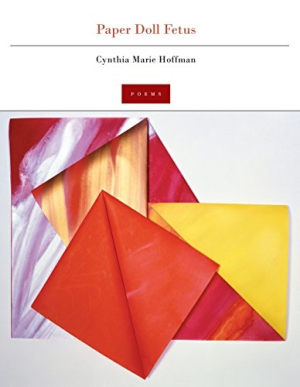Paper Doll Fetus
Playing with perspective and personification, Hoffman introduces new observations about pregnancy.
In her poetry collection Paper Doll Fetus, Cynthia Marie Hoffman takes on a voice of the disenfranchised, those made marginal and strange in the world of obstetrics, and creates for them a platform for their extraordinary, often sad stories. Hoffman uses research extensively, and it adds a depth and range of subject matter that many contemporary poets do not achieve. This book fascinates, surprises, engages, and enlightens on well-trodden subject matter; it is an achievement among contemporary project books.
This book engages pregnancy from a historical and contemporary point of view, describing long-forgotten theories like maternal impression and recapitulation theory, as well as old wives’ tales of storks. On the contemporary side, she writes of miscarriages, ectopic pregnancies, and C-sections, but rarely as one might expect. Instead, in “The Liver Speaks to the Ectopic Embryo,” she writes as the liver: “For many years you did not exist and then you appeared, / a pale speck towing your red moon by a string.” Often, Hoffman takes readers into the body, playing with perspective in ways that create immediacy and a sudden feeling of alienation from the body.
In exploring history, Hoffman introduces readers to the barbarism of some scientific inquiry—the child born with two heads and two sets of limbs who is cut open to divine its one heart. A woman is buried alive with her child, another has a calcified fetus within her. In almost every poem, Hoffman unearths something new, a new mode of expression or perspective or music.
Hoffman resists the utterly happy ending. These lines, for instance, from “The Paper Doll Fetus Speaks to the Viable Twin in Utero” suggest that humans both remember and forget simultaneously; the moments of becoming are so beautifully articulated in the book.
I am becoming a scrap of parchment on which is scrawled my flattened waxy face.
Unfold me. You will find a tiny skeleton stirred into the paper. I am a letter
to you, and it says if you held me up to the wind I would flutter away.
The voices sound rich with longing, with fear. Throughout, the casualties of the carrying a child begin to mount but the book ends, after long labor, with the delivery of the child via stork:
When the beak
opens, and darkness takes
us, wipes our minds
with soot so there is
only the long fall, the
touch of human skin. Our
boundedness to earth. What
we remember.
Hoffman forces readers to engage with her subject by integrating history with a sophisticated use of personification and persona. This book ups the game for poetry-project volumes and encourages both readers and writers into discovery.
Reviewed by
Camille-Yvette Welsch
Disclosure: This article is not an endorsement, but a review. The publisher of this book provided free copies of the book to have their book reviewed by a professional reviewer. No fee was paid by the publisher for this review. Foreword Reviews only recommends books that we love. Foreword Magazine, Inc. is disclosing this in accordance with the Federal Trade Commission’s 16 CFR, Part 255.

